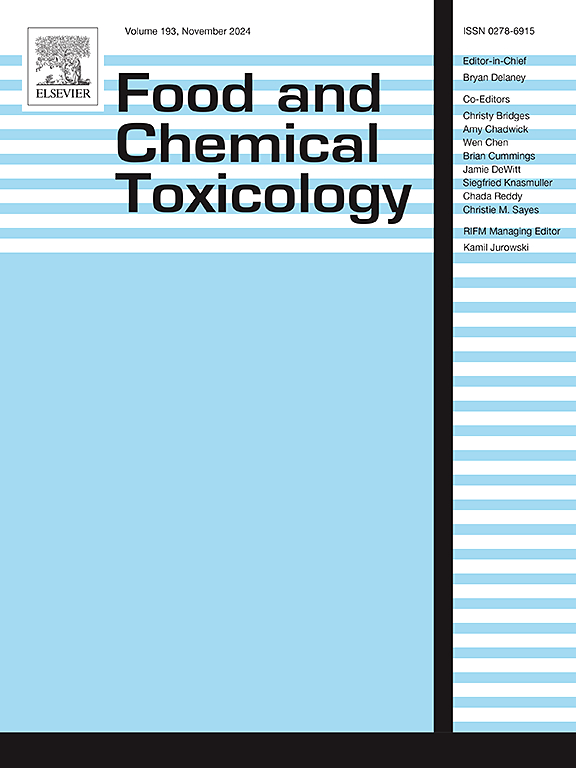l-theanine alleviates ulcerative colitis by repairing the intestinal barrier through regulating the gut microbiota and associated short-chain fatty acids
IF 3.9
3区 医学
Q2 FOOD SCIENCE & TECHNOLOGY
引用次数: 0
Abstract
Ulcerative colitis (UC) is closely related to impaired intestinal barrier function and imbalanced gut microbial communities. l-theanine shows great potential in maintaining intestinal integrity and regulating the gut microbiota and associated short-chain fatty acids (SCFAs). However, whether l-theanine can alleviate UC by repairing the intestinal barrier through these regulatory processes remains unclear. In this study, l-theanine was used to optimize the gut microbiota, and the restorative effect and mechanism of l-theanine in UC by repairing the gut barrier through the gut microbiota and SCFAs were investigated via fecal microbiota transplantation. The findings revealed that l-theanine regulated the gut microbiota structure, increased SCFA contents, and promoted gut barrier repair in UC mice. Moreover, l-theanine upregulated the protein and mRNA expression of G-protein-coupled receptor 43 (GPR43), AKT, and phosphatidylinositide 3-kinase (PI3K). These results indicated that l-theanine alleviates UC by repairing the gut barrier via regulating the gut microbiota and SCFAs through the GPR43/PI3K/AKT signaling pathway activation. This study provides a method of preventing and treating UC via l-theanine as a safe food dietary supplement.
l -茶氨酸通过调节肠道菌群和相关短链脂肪酸修复肠道屏障,缓解溃疡性结肠炎。
溃疡性结肠炎(UC)与肠道屏障功能受损和肠道微生物群落失衡密切相关。l -茶氨酸在维持肠道完整性和调节肠道微生物群和相关短链脂肪酸(SCFAs)方面显示出巨大的潜力。然而,l -茶氨酸是否可以通过这些调节过程修复肠道屏障来减轻UC仍不清楚。本研究采用l -茶氨酸优化肠道菌群,通过粪便菌群移植研究l -茶氨酸通过肠道菌群和scfa修复肠道屏障对UC的修复作用及其机制。研究结果表明,l -茶氨酸调节UC小鼠肠道菌群结构,增加SCFA含量,促进肠道屏障修复。此外,l -茶氨酸上调g蛋白偶联受体43 (GPR43)、AKT和磷脂酰肌苷3激酶(PI3K)的蛋白和mRNA表达。这些结果表明,l -茶氨酸通过激活GPR43/PI3K/AKT信号通路,调节肠道菌群和SCFAs,从而通过修复肠道屏障来缓解UC。本研究提供了一种通过l -茶氨酸作为一种安全的食品补充剂来预防和治疗UC的方法。
本文章由计算机程序翻译,如有差异,请以英文原文为准。
求助全文
约1分钟内获得全文
求助全文
来源期刊

Food and Chemical Toxicology
工程技术-毒理学
CiteScore
10.90
自引率
4.70%
发文量
651
审稿时长
31 days
期刊介绍:
Food and Chemical Toxicology (FCT), an internationally renowned journal, that publishes original research articles and reviews on toxic effects, in animals and humans, of natural or synthetic chemicals occurring in the human environment with particular emphasis on food, drugs, and chemicals, including agricultural and industrial safety, and consumer product safety. Areas such as safety evaluation of novel foods and ingredients, biotechnologically-derived products, and nanomaterials are included in the scope of the journal. FCT also encourages submission of papers on inter-relationships between nutrition and toxicology and on in vitro techniques, particularly those fostering the 3 Rs.
The principal aim of the journal is to publish high impact, scholarly work and to serve as a multidisciplinary forum for research in toxicology. Papers submitted will be judged on the basis of scientific originality and contribution to the field, quality and subject matter. Studies should address at least one of the following:
-Adverse physiological/biochemical, or pathological changes induced by specific defined substances
-New techniques for assessing potential toxicity, including molecular biology
-Mechanisms underlying toxic phenomena
-Toxicological examinations of specific chemicals or consumer products, both those showing adverse effects and those demonstrating safety, that meet current standards of scientific acceptability.
Authors must clearly and briefly identify what novel toxic effect (s) or toxic mechanism (s) of the chemical are being reported and what their significance is in the abstract. Furthermore, sufficient doses should be included in order to provide information on NOAEL/LOAEL values.
 求助内容:
求助内容: 应助结果提醒方式:
应助结果提醒方式:


